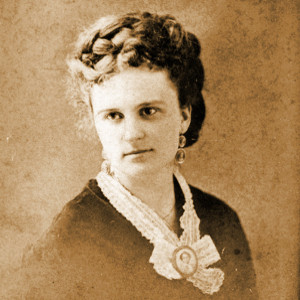
From "American Passages: A Literary Survey"
Kate Chopin introduced American readers to a new fictional setting with her evocations of the diverse culture of Cajun and Creole Louisiana. But while much of Chopin's work falls into the category of regionalism, her stories and especially her novel, The Awakening, are also notable for their introduction of controversial subjects like women's sexuality, divorce, extramarital sex, and miscegenation.
Kate Chopin was born in St. Louis, Missouri, to a socially prominent, financially secure family...At the age of nineteen she married Oscar Chopin, a French Creole from a Louisiana planter family. After a glamorous European honeymoon, the couple settled in New Orleans, where Oscar went into business as a cotton broker and Kate became active in the city's social life. Her fluency in French and southern sympathies ensured that she fit easily into New Orleans society.
When the cotton brokerage business failed in 1879, the Chopins relocated to Natchitoches Parish in rural Louisiana, where they intended to operate one of Oscar's father's cotton plantations. But by 1883 Oscar Chopin had died of swamp fever, leaving Kate Chopin a thirty-two-year-old widow with six children to support and limited financial resources. After running the plantation on her own for a year, Chopin returned to St. Louis, where she moved into her mother's house and began writing poetry and short stories. Drawing on her experiences in New Orleans and Natchitoches, Chopin created realistic depictions of the distinctive customs of the region and captured the cadences and diction of Louisiana speech in her dialogue. By 1893, she had published her first novel, At Fault, and placed stories in such prestigious venues as the Atlantic Monthly, Vogue, and Century. In 1894 she published an extremely successful collection of short stories, Bayou Folk, and followed it up with another volume of stories about Louisiana entitled A Night in Acadie.
We will read three short stories by Chopin, and do some ground work for an eventual literary analysis. Here are some choice quotes and notes from the stories.
Kate Chopin was born in St. Louis, Missouri, to a socially prominent, financially secure family...At the age of nineteen she married Oscar Chopin, a French Creole from a Louisiana planter family. After a glamorous European honeymoon, the couple settled in New Orleans, where Oscar went into business as a cotton broker and Kate became active in the city's social life. Her fluency in French and southern sympathies ensured that she fit easily into New Orleans society.
When the cotton brokerage business failed in 1879, the Chopins relocated to Natchitoches Parish in rural Louisiana, where they intended to operate one of Oscar's father's cotton plantations. But by 1883 Oscar Chopin had died of swamp fever, leaving Kate Chopin a thirty-two-year-old widow with six children to support and limited financial resources. After running the plantation on her own for a year, Chopin returned to St. Louis, where she moved into her mother's house and began writing poetry and short stories. Drawing on her experiences in New Orleans and Natchitoches, Chopin created realistic depictions of the distinctive customs of the region and captured the cadences and diction of Louisiana speech in her dialogue. By 1893, she had published her first novel, At Fault, and placed stories in such prestigious venues as the Atlantic Monthly, Vogue, and Century. In 1894 she published an extremely successful collection of short stories, Bayou Folk, and followed it up with another volume of stories about Louisiana entitled A Night in Acadie.
We will read three short stories by Chopin, and do some ground work for an eventual literary analysis. Here are some choice quotes and notes from the stories.
No comments:
Post a Comment